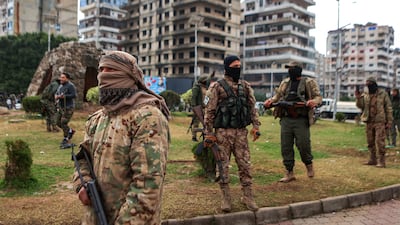Forces allied to Syria's new government on Wednesday battled with militias in the south and near the Mediterranean coast.
Sources said the fighting in the coastal city of Latakia and in the town of Sanamin in Deraa province has left at least 20 people dead since Monday, including civilians.
The clashes indicate resistance among some segments of Syrian society to the new government, led by Hayat Tahrir Al Sham, a group formerly linked with Al Qaeda. Violence has persisted in areas inhabited by members of Druze and Kurdish minorities, as well as the coast, home to ousted president Bashar Al Assad's Alawite minority.
The Interior Ministry said that a "cell" of former members of Assad loyalist militias killed two members of the security forces this week. The attackers were traced to the city's Daatour neighbourhood, and a security sweep of the area was launched. The district is regarded as a depot of the "shabbiha", auxiliaries who fought alongside Mr Al Assad's regular forces during the civil war.
"A special security force gathered information and was able to [identify] a member of the cell and overran its hiding place," an Interior Ministry statement said. It added that an unspecified number of "criminal elements" were neutralised.
A security source in Latakia said HTS force killed seven shabbiha members in Daatour. The Syrian Observatory for Human Rights, a war monitor based in Britain, said four civilians were killed in the area.
An Alawite sheikh in Latakia told The National that heavily armed men entered Daatour in armoured vehicles and shouted sectarian slogans. They proceeded to carry out mass arrests of men, claiming that the residents were "remnants of the regime".
He said he had heard that the killing of two security troops was the reason for the raid, but: "There is no evidence that the one who attacked the security forces is from the neighbourhood. If there are outlaws, they have nothing to do with the innocent residents."
In southern Syria, HTS launched an offensive against a group led by Mohammad Al Humaid, a warlord in Sanamin who resisted the government's call to disarm.
Mr Al Humaid had carved out a degree of independence under the Assad regime, and is accused of having harboured ISIS members. His loyalists, based in western Sanamin, have clashed repeatedly with HTS in the past two months.
A local police official said the town had been under curfew since Monday after three of the warlord's fighters were killed. The group retaliated by attacking a government roadblock, after which the HTS-led forces launched an operation in the western sector where 100 of Mr Al Humaid's men were believed to be.
A security official in Deraa said 150 members of an HTS elite force, called the Red Bands, had arrived from Damascus to join the offensive, in which mid-range weapons and armoured vehicles were being used. Three members of the HTS-led security forces and eight of Mr Al Humaid's men have been killed, he said.
"The operation will not conclude before Al Humaid hands himself in," the commander said. He added that five civilians have been wounded, although there have been evening truces to allow non-combatants to leave the battle zone.
Another official said the fighting "took place in between civilian homes".
HTS forces were sent to southern areas near the border with Jordan in December, shortly after rebel forces led by HTS toppled Mr Al Assad, and appointed new local security chiefs who sought to co-opt the different local militias without the use of violence. Only Mr Al Humaid's militia refused.
HTS leader Ahmad Al Shara, now interim President, has launched the process of political transition but is considered unwilling to divest much power from Damascus. He has pledged that former Assad regime elements will face justice for crimes committed during the 2011-24 civil war, and that the new government will extend its control over the whole country.
But lawlessness has persisted, with revenge killings bringing more fears about the future, and militias of different ideologies remain entrenched in parts of the country.
HTS has launched several incursions into the coastal Alawite Mountains in pursuit of what it calls regime elements. But it has met resistance and on several occasions HTS members were killed in ambushes.
The Alawite sheikh said the Daatour raid was part of the persecution of Alawites, who dominated the political system and were disproportionately represented in the army and administration under Mr Al Assad.
He said Alawites were being dismissed from government jobs on the pretext of excess staffing, and entire Alawite families displaced from some mixed areas.
"All this deepens the gap between the people and the government, and confirms the lack of trust in the current government," he said.
He urged the international community to place greater pressure on Syria's new leaders "to achieve human justice among citizens, and to protect the people's security, instead of killing".

